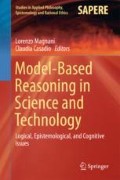Abstract
This paper contributes to the understanding of human problem solving involved in mental tasks that require exploration among alternatives. Examples of such tasks are theorem proving and classical games like chess. De Groot’s largely used model of chess players’ thinking conceptually consists of two stages: (1) detection of general possibilities, or “motifs”, that indicate promising ideas the player may try to explore in a given chess position, and (2) calculation of concrete chess variations to establish whether any of the motifs can indeed be exploited to win the game. Strong chess players have to master both of these two components of chess problem solving skill. The first component reflects the player’s chess-specific knowledge, whereas the second applies more generally in game playing and other combinatorial problems. In this paper, we studied experimentally the relative importance of the two components of problem solving skill in tactical chess problems. A possibly surprising conclusion of our experiments is that for our type of chess problems, and players over a rather large range of chess strength, it is the calculating ability, rather than chess-specific pattern-based knowledge, that better discriminates among the players regarding their success. We also formulated De Groot’s model as a Causal Bayesian Network and set the probabilities in the network according to our experimental results.
Access this chapter
Tax calculation will be finalised at checkout
Purchases are for personal use only
References
De Groot, A. D. (1946). Het denken van den schaker. Mij: Noord-Hollandsche Uitg.
De Groot, A. D. (1978). Thought and choice in chess, Vol. 4. Berlin: Walter de Gruyter.
Elo, A. E. (1978). The rating of chess players, past and present. New York: Arco Pub.
Glickman, M. E. (1999). Parameter estimation in large dynamic paired comparison experiments. Journal of the Royal Statistical Society: Series C (Applied Statistics), 48(3), 377–394.
Hristova, D., Guid, M., & Bratko, I. (2014a). Toward modeling task difficulty: the case of chess. In COGNITIVE 2014, the sixth international conference on advanced cognitive technologies and applications (pp. 211–214). IARIA.
Hristova, D., Guid, M., & Bratko, I. (2014b). Assessing the difficulty of chess tactical problems. International Journal on Advances in Intelligent Systems, 7(3 & 4), 728–738.
Kotov, A. (1971). Think like a grandmaster (english translation). London: B.T Batsford.
Newell, A. (1990). Unified theories of cognition: The William James Lectures 1987. Cambridge: Harvard University Press.
Newell, A., & Simon, H. A. (1972). Human problem solving. Upper Saddle River: Prentice-Hall.
Reingold, E., & Charness, N. (2005). Perception in chess: Evidence from eye movements. In G. Underwood (Ed.), Cognitive processes in eye guidance. Oxford: Oxford university press.
Tikhomirov, O. K., & Poznyanskaya, E. D. (1966). An investigation of visual search as a means of analyzing heuristics. Soviet Psychology, 5, 2–15. (Translated from Voprosy Psikhologii, 2, 39–53.).
Wenzhe, L. (2002). Chinese school of chess: The unique approach, training methods and secrets (english translation). London: B.T. Batsford.
Online Resources
Chessintranslation.com, 02.03.2011. http://www.chessintranslation.com/2011/03/le-quang-liem-and-the-soviet-school-of-chess/. Last access January 1, 2016.
Chess Tempo web site. www.chesstempo.com. Last access January 6, 2016.
Author information
Authors and Affiliations
Corresponding author
Editor information
Editors and Affiliations
Rights and permissions
Copyright information
© 2016 Springer International Publishing Switzerland
About this paper
Cite this paper
Bratko, I., Hristova, D., Guid, M. (2016). Search Versus Knowledge in Human Problem Solving: A Case Study in Chess. In: Magnani, L., Casadio, C. (eds) Model-Based Reasoning in Science and Technology. Studies in Applied Philosophy, Epistemology and Rational Ethics, vol 27. Springer, Cham. https://doi.org/10.1007/978-3-319-38983-7_32
Download citation
DOI: https://doi.org/10.1007/978-3-319-38983-7_32
Published:
Publisher Name: Springer, Cham
Print ISBN: 978-3-319-38982-0
Online ISBN: 978-3-319-38983-7
eBook Packages: Religion and PhilosophyPhilosophy and Religion (R0)

